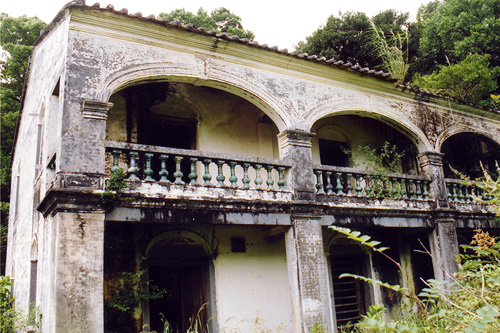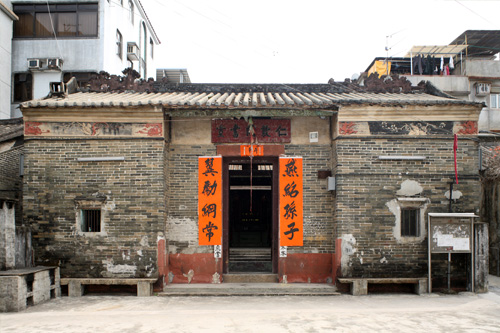The Government today (November 6) announced the declaration of the residence of Ip Ting-sz at Lin Ma Hang Tsuen, Sha Tau Kok, and Yan Tun Kong Study Hall and its adjoining land at Hang Tau Tsuen, Ping Shan, Yuen Long as monuments under the Antiquities and Monuments Ordinance. A notice on the declaration was gazetted today.
Following the declaration, the Antiquities and Monuments Office will carry out restoration works costing $7.6 million to the residence of Ip Ting-sz and work costing $6.9 million on Yan Tun Kong Study Hall. Both buildings will be opened for public viewing after completion of the restoration works by 2011.
The residence of Ip Ting-sz, which was built in 1908, is modelled on Dr Sun Yat-sen's residence in Cuiheng Village, Zhongshan. Ip Ting-sz (1882-1943), alias Tin-fat, and also known by his literary name Kwong-san, was the eighth generation ancestor of the Ips in Lin Ma Hang, Sha Tau Kok. He went to Thailand at an early age to work as an apprentice tailor before setting up a garment factory manufacturing military uniforms.
Information from the Chinese Association in Thailand shows that Dr Sun Yat-sen founded the Chinese Club in Thailand (later renamed the Chinese Association in Thailand) in 1907 to rally support for his revolutionary activities among overseas Chinese. As one of the originators and co-founders, Ip was a key figure of the Chinese Association at its initial founding stage. In the following year, Dr Sun went to Bangkok to form the Tong Meng Hui (United League), which recruited more than 30 members, and Ip was one of them. He was later assigned to take charge of the work involved in the recruitment of Hakka people. Ip Ting-sz and his family returned to settle in Lin Ma Hang Tsuen in 1936 where Ip passed away in 1943.
The residence, which is made of green bricks and timber with a pitched Chinese tiled roof and external walls embellished with murals of auspicious motifs, is a blend of Chinese and Western architectural features. The residence is built in a symmetrical layout and is fronted by a covered porchway with columns supporting the balcony with ceramic vase-shaped balusters on the first floor.
Yan Tun Kong Study Hall, alias "Yin Yik Tong", is a three-hall building with two open courtyards in between. The exact year of its construction is unknown. According to the indigenous villagers, it was originally built by the descendants of the Tang clan of Ping Shan to commemorate their prominent 14th to 16th generation ancestors Tang Wai-tak (alias Yan-shaw), Tang Ji-fong (alias Tun-fuk) and Tang Fung (alias Ming-kong). The engraved characters of "re-carved in the ninth year of Tongzhi reign" (1870) on the wooden plaque hanging over the main hall suggest that the study hall underwent large-scale renovation in 1870.
The study hall was built to educate the clan youngsters to prepare them for the Imperial Civil Service Examinations. Since most instructors recruited came from Guangzhou, the side rooms in the study hall were provided as accommodation for them. With the abolition of the Imperial Civil Service Examination, the study hall was converted into a teaching venue for village children. Its function as a study hall gradually faded with the founding of Tat Tak School in Ping Shan in the 1930s.
Apart from teaching purposes, Yan Tun Kong Study Hall is also serving as an ancestral hall. Soul tablets commemorating ancestors of the Tang clan in Hang Tau Tsuen are worshipped at the main altar in the middle hall. Nowadays, the Tang descendants still gather in the study hall to hold traditional clan festivals and activities, such as the ancestor worship of the Spring and Autumn Equinox, weddings and celebrations.
Ends/Friday, November 6, 2009

